Research 2021 Year in Review! Lots of research being done in a difficult year of restrictions. Our researchers care about how the pandemic and other issues are impacting communities and the field of education and are doing research that matters.
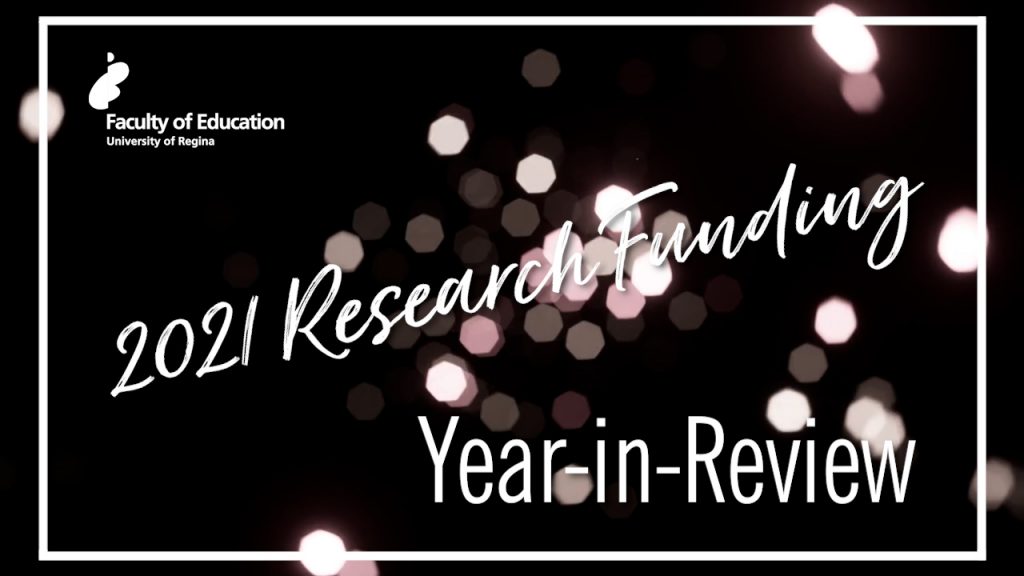

Research 2021 Year in Review! Lots of research being done in a difficult year of restrictions. Our researchers care about how the pandemic and other issues are impacting communities and the field of education and are doing research that matters.
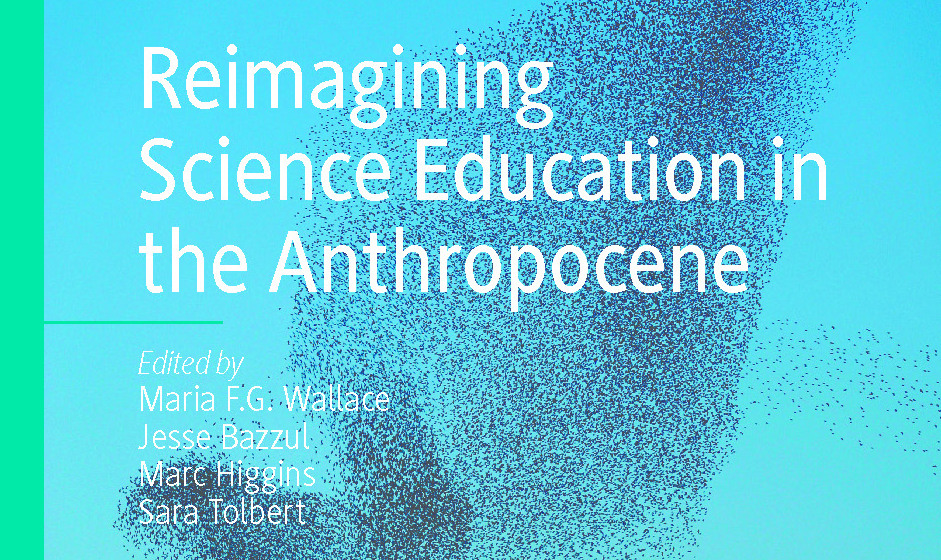
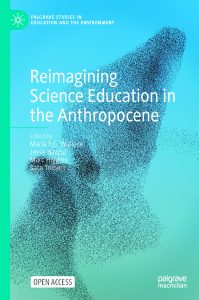 New Book! Congratulations to Dr. Jesse Bazzul and co-editors on their new open-access book titled, Reimagining Science Education in the Anthropocene” with chapters by #UREdu‘s Dr. Xia Ji, “‘Trees Don’t Sing!…Eagle Feather Has no Power!’—Be Wary of the Potential Numbing Effects of School Science”; Miranda Field, “Decolonizing Healing Through Indigenous Ways of Knowing”; and Dr. Jesse Bazzul (co-author), “A Feral Atlas for the Anthropocene: An Interview with Anna L. Tsing.”
New Book! Congratulations to Dr. Jesse Bazzul and co-editors on their new open-access book titled, Reimagining Science Education in the Anthropocene” with chapters by #UREdu‘s Dr. Xia Ji, “‘Trees Don’t Sing!…Eagle Feather Has no Power!’—Be Wary of the Potential Numbing Effects of School Science”; Miranda Field, “Decolonizing Healing Through Indigenous Ways of Knowing”; and Dr. Jesse Bazzul (co-author), “A Feral Atlas for the Anthropocene: An Interview with Anna L. Tsing.”
Part of the Palgrave Studies in Education and the Environment book series (PSEE)
Editors Maria F. G. Wallace; Jesse Bazzul; Marc Higgins; Sara Tolbert
This book:
“Reconceptualizes science education in ways that center the concerns and interests of marginalized people.”
“Encourages multimodality in expression, including the use of pictures, graphics, multimedia, and different genres of writing.”
Download at https://link.springer.com/book/10.1007/978-3-030-79622-8
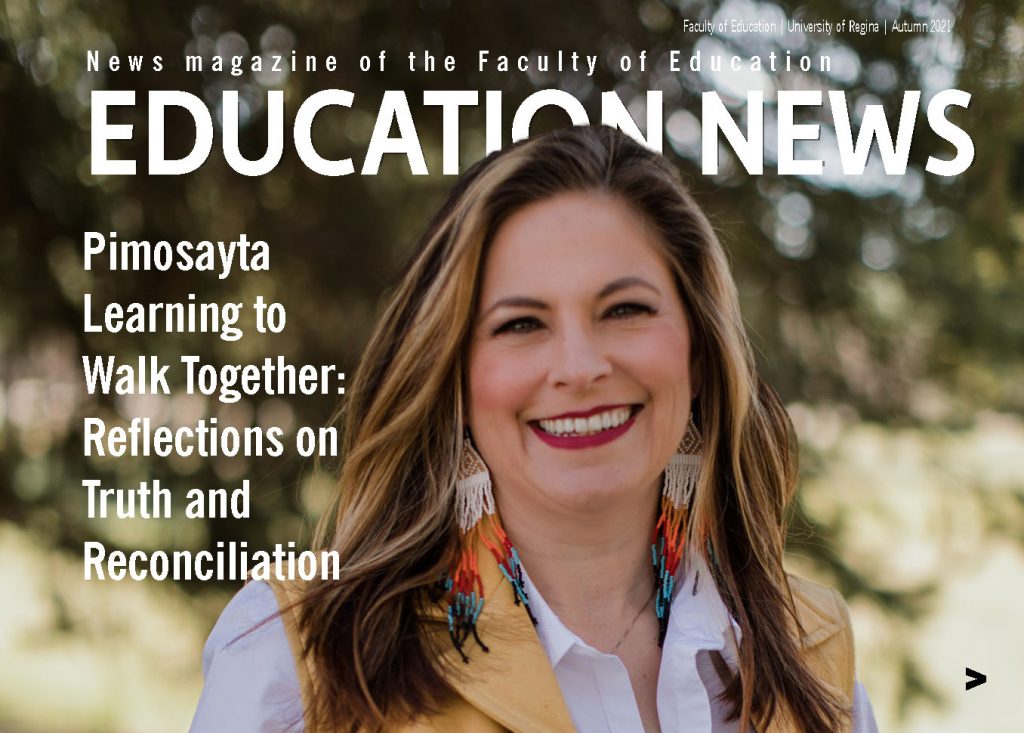
In This Issue:
A note from the Dean…..3
Stories about Indigenous education and unmarked gravesites in Canada…..4
Artistic expressions: masinahikêwin yêkâhk/ Writing in the sand poem…..10
Inaugural Gabriel Dumont Research Chair in Métis/Michif Education…..13
Education Students’ Society Truth and Reconciliation Week events…..16
Candidate for the Vanier Canada Graduate Scholarships Doctoral Awards 2021-2022 competition…..17
“I need to be in the quinzhee, not just talk about it!” Embodying our pedagogy…..18
Pimosayta: Learning to walk together slideshow…..21
Les étudiants du Bac mènent les activités de la Journée nationale de vérité et de réconciliation…..22
Le Bac student activities…..23
Funding and awards…..24
New faculty and staff…..26
Retirements…..27
Published research…..28
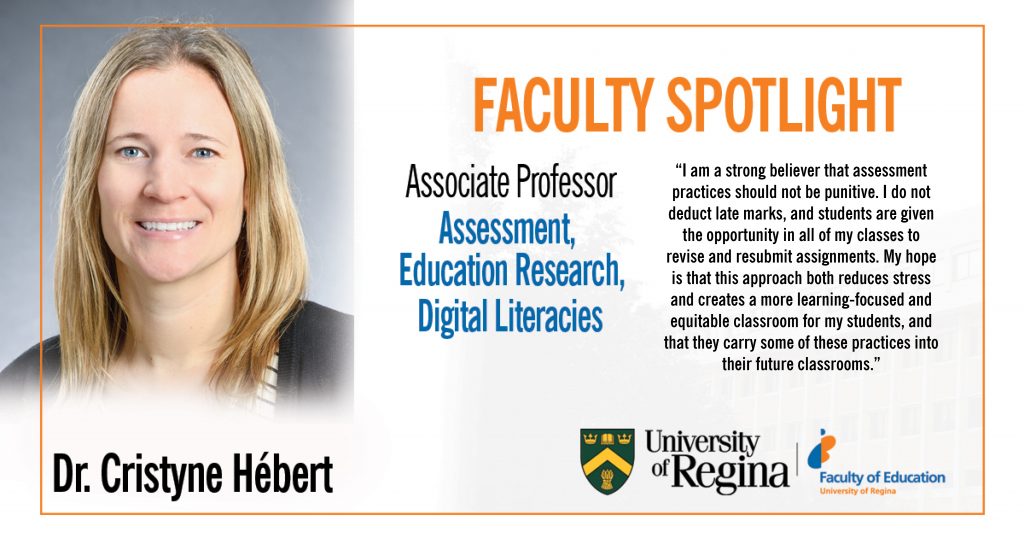
Faculty Spotlight! We’re shining the spotlight on faculty members this fall so you can get to know some of the faces around the Faculty of Education.
Meet Dr. Cristyne Hébert, Associate Professor in the areas of assessment, education research, and digital literacies since July 2018.
Dr. Hébert is passionate about stress-free, learning-focused and equitable assessment. She says, “I am a strong believer that assessment practices should not be punitive. I do not deduct late marks, and students are given the opportunity in all of my classes to revise and resubmit assignments. My hope is that this approach both reduces stress and creates a more learning-focused and equitable classroom for my students, and that they carry some of these practices into their future classrooms.”
Why should students consider taking courses in assessment? Because, “it’s important that new teachers think critically about their assessment practices, moving away from some of those traditional approaches that we know don’t support all learners. Teacher education gives future teachers the space to really practice and try on something new,” says Dr. Hébert.
Digital literacies are another area of study that Dr. Hébert considers important for students: “We live in such a digitally mediated world. As educators, we need to know more than just what to do with technological tools. Developing a deep understanding of how media shapes lived experiences, and how power operates (often covertly) within systems to limit access and participation is of fundamental importance.”
Dr. Hébert’s current research involves both assessment and digital literacies. She recently (2020) received a SSHRC Insight Development Grant for her study on multimodal learning and assessment practices in the province. As part of a larger SEED grant-funded project, Dr. Hébert says, “I am currently analyzing provincial school divisions’ assessment policies, focusing on modernizing provincial assessment.” Dr. Hébert has a few other research projects underway, “working with both in-service and preservice teachers to look at how maker education might be enacted in the classroom.”
As advice for Education students, Dr. Hébert says, “Visit your professors during office hours. We set aside this time to meet with students to answer questions or talk through any course content or assignments, and are happy to see you there.”
If you are interested in taking a course with Dr. Hébert, she regularly teaches ECS401 (online): “This course takes a backward-design approach to assessment, narrowing in on curricular outcomes. Students gain experience with formative assessment, assessment tools, peer and self assessment, triangulation, and differentiation. My two favourite elements of the course are the assessment videos we watch, created by practicing teachers in the province, and the Rick Rant assignment, where students produce a three minute argumentative ‘paper.'” And she teaches EC&I 832 (online): “This course takes a critical look at digital citizenship and media literacies, focusing on how we might empower (rather than protect) young media users. Some themes we address include algorithms, technology and surveillance, memes and visual literacies, propaganda and fake news, and policing on line spaces. My favourite element of this course is the weekly collaborative work students produce, via Google Docs, applying their learning to analyze media.”
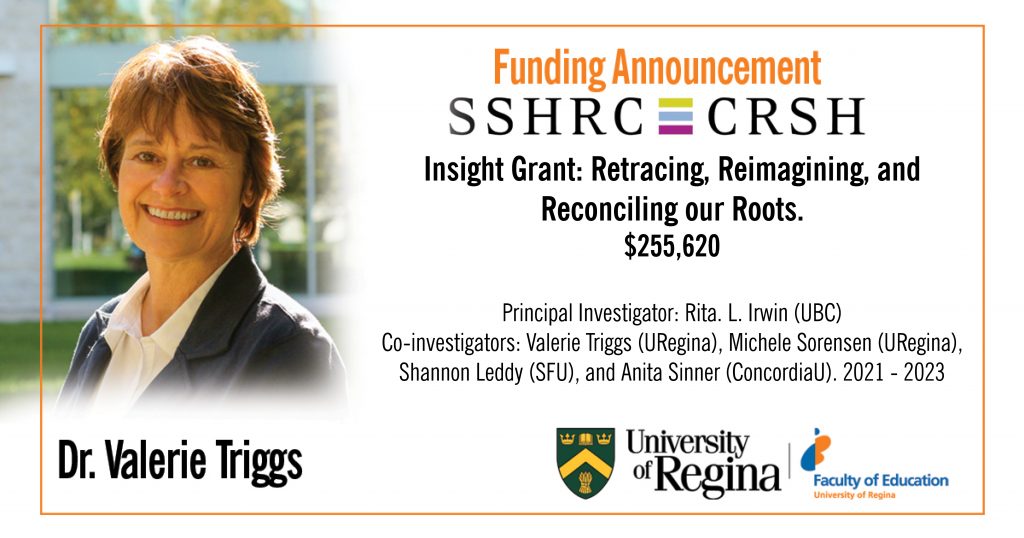

“Now more than ever, it is important that we are teaching our students how to live healthy active lifestyles. Highlights of this course of study include experiential learning in the classroom, gymnasium, and out-of-doors.”
Faculty Spotlight! We’re shining the spotlight on some of our faculty members this fall so you can get to know the faces around the Faculty of Education.
Meet Dr. Alexandra Stoddart, Assistant Professor in the Health, Outdoor, Physical Education (HOPE) subject area since 2017.
Two things shine through about Dr. Stoddart: her passion for “building relationships with students and for re-instilling and/or growing their love for physical activity.” Her own love for physical activity is demonstrated in her off hours, in which she says, “I love to be physically active. Flying through the air at Fly Studios YXE, playing volleyball, or going to the gym are a few of the ways I strive for balance with my overall health and well-being.”
Dr. Stoddart’s research interest in physical education pedagogy, the physical education curriculum, and physical literacy has recently focused in on exploring 2SLGBTQ+ student experiences in PE. This research was recently awarded a Humanities Research Institute Micro-grant.
As advice for Education students, Dr. Stoddart says, “Remember why you are here. It can be difficult when you have lots of papers, lesson plans, and assignments to do, but if you stop and reflect on the reason why – because you want to positively impact children’s lives – it helps you get through the grind.”
If you are interested in taking a course with Dr. Stoddart, she regularly teaches EPE310 (Physical Education for K-Gr. 8), EHE350 (School Health Education), and graduate courses. A course Dr. Stoddart says she thinks you will enjoy is,”EPE310, a highlight for me to teach because teaching PE at the elementary level was my favourite. I would encourage students to take EPE310 as it showcases how quality PE should be taught. Unfortunately many students have had a negative experience with PE in their own K-12 education. EPE310 can show students how PE should have been taught and how they can make the subject a positive experience for their future students.”

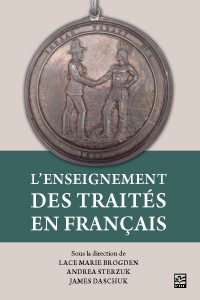 Congratulations to the Editors (alum) Lace Brogden (StFX) Andrea Sterzuk (UofR Education) and James Daschuk (UofR) on a new book L’enseignement des traités en français & to #UREdu faculty, students & alum chapter authors: Heather Phipps, Anna-Leah King, Michael Cappello, Claire Kreuger, Carrie Vany, Naomi Fortier-Fréçon, Leia Laing, Margo Campbell, and Sylvia Smith.
Congratulations to the Editors (alum) Lace Brogden (StFX) Andrea Sterzuk (UofR Education) and James Daschuk (UofR) on a new book L’enseignement des traités en français & to #UREdu faculty, students & alum chapter authors: Heather Phipps, Anna-Leah King, Michael Cappello, Claire Kreuger, Carrie Vany, Naomi Fortier-Fréçon, Leia Laing, Margo Campbell, and Sylvia Smith.
“Conçu pour appuyer l’enseignement des traités, cet ouvrage, orienté vers les enseignants en formation initiale et continue, met en valeur des approches pédagogiques et des apports théoriques ancrés dans le vouloir de veiller à la décolonisation. Ainsi, ce livre cherche à expliciter en quoi les pédagogues sont agents de changements et encourage l’adoption d’une approche proactive et anti-oppressive dans une pédagogie au service de l’appel à l’action no 62 de la Commission de vérité et de réconciliation du Canada (2015). Ainsi, les chapitres du livre adoptent une approche réfléchie, ayant pour but de préconiser une philosophie de l’enseignement qui dessert la population estudiantine, autant autochtone que non autochtone…” Read more https://www.pulaval.com/produit/l-enseignement-des-traites-en-francais
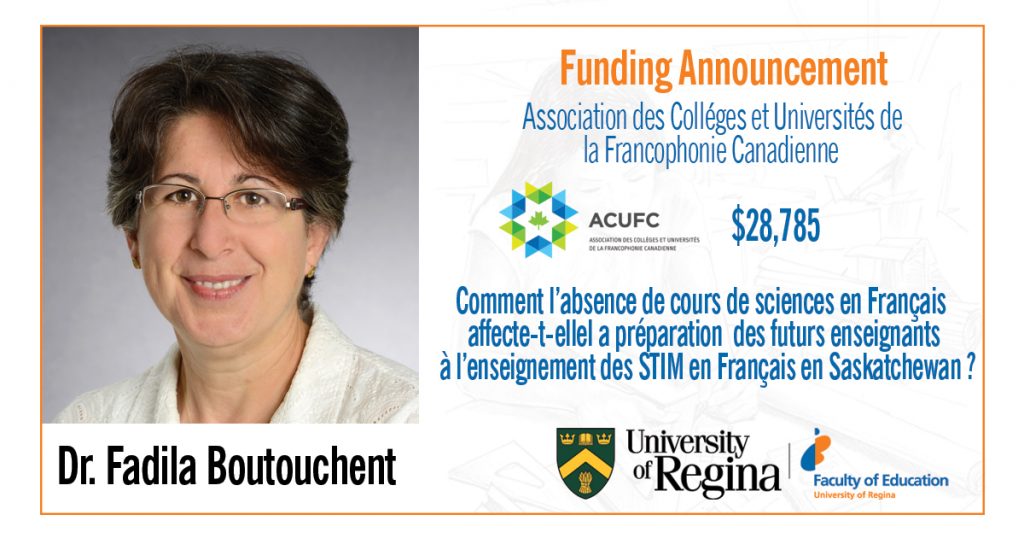
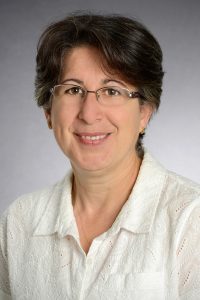
Congratulations to Dr. Fadila Boutouchent, professeure agrégée – Programme du baccalauréat en éducation, on obtaining Association des Colléges et Universités de la Francophonie Canadienne (ACUFC) funding for her project entitled, “Comment l’absence de cours de sciences en Français affecte-t-elle la préparation des futurs #enseignants à l’enseignement des #STIM en Français en #Saskatchewan ?” in the amount of $28,785.
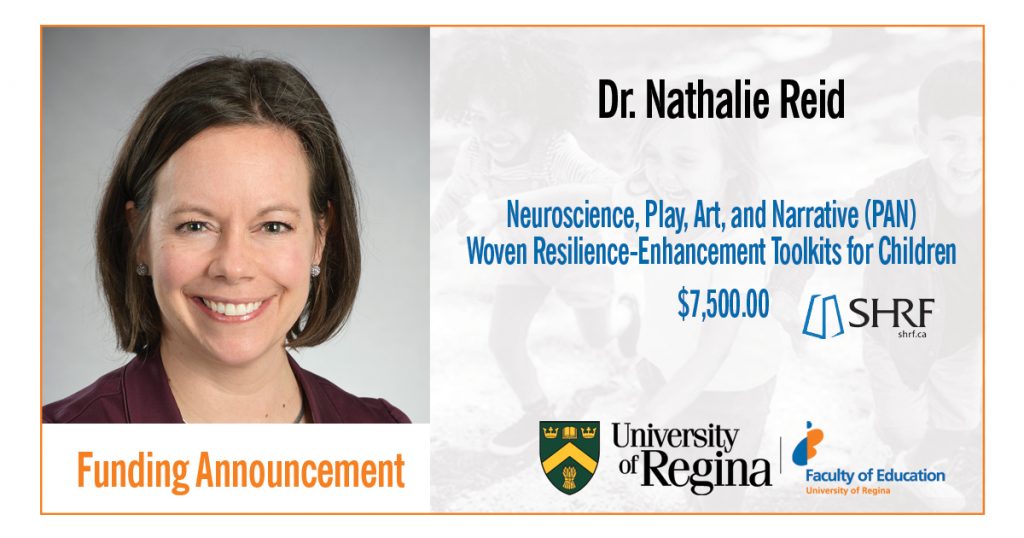
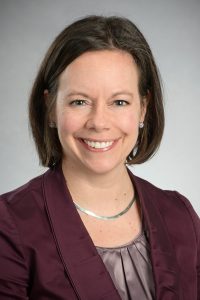
Congratulations to Dr. Nathalie Reid, Director of the Child Trauma Research Centre at the University of Regina, on receiving a Saskatchewan Health Research Foundation (SHRF) Research Connection Grant of $7,500 to study “Neuroscience, Play, Art, and Narrative (PAN) Woven Resilience-Enhancement Toolkits for Children.”
In 2020, Dr. Reid was also a recipient of a SHRF Research Connections Grant of $10,000 for the project “Creating a Digital Connections Hub to Support Children in Care in Saskatchewan During COVID-19 and Beyond.”
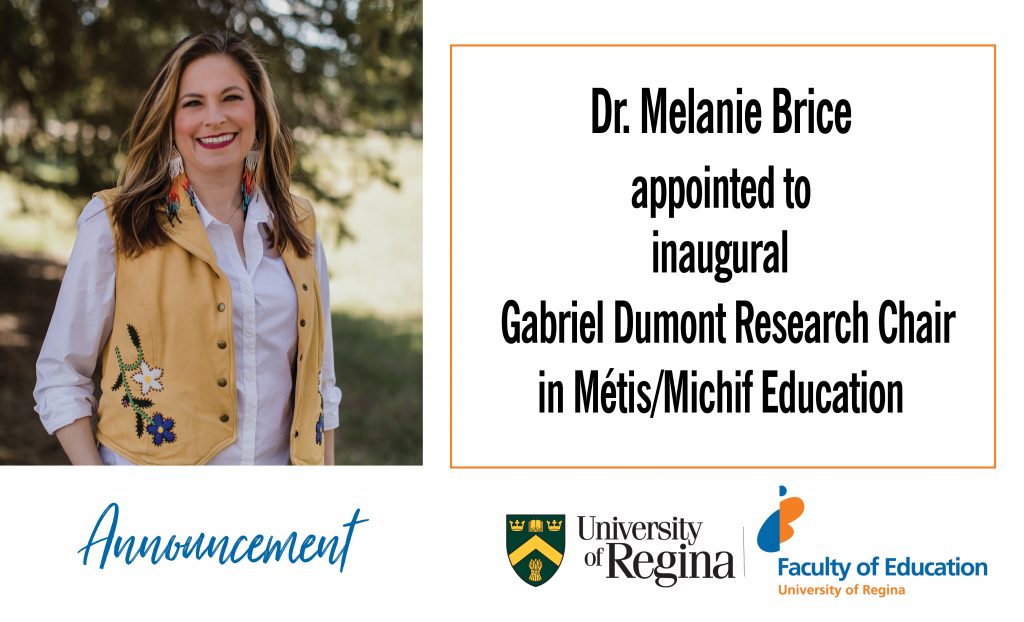
We are pleased to announce the launch of the inaugural Gabriel Dumont Research Chair in Métis/Michif Education within the Faculty of Education, University of Regina.
Dr. Melanie Brice has been appointed to the inaugural Gabriel Dumont Chair in Métis/Michif Education for a 5-year term. Dr. Brice has been working with the University of Regina Faculty of Education since 2018 as an Assistant Professor in Indigenous Education, Language & Literacy Education, and Educational Core Studies. Dr. Brice a Michif (Métis) born in Meadow Lake and raised at Jackfish Lake, Saskatchewan has a strong understanding of Indigenous histories, cultures, languages and literacies, perspectives, educational experiences, and cross-cultural education issues.
The Gabriel Dumont Chair in Métis/Michif Education will increase research and teaching capacity in Métis/Michif Education in the Faculty of Education at the University of Regina and enhance academic engagement with Gabriel Dumont Institute’s (GDI’s) Saskatchewan Urban Native Teacher Education Program (SUNTEP).
As Chair, Dr. Brice will focus on the research that seeks to understand and expand the scholarship of teaching and learning by building capacity in Métis and Michif education. The research program will focus on research, learning, knowledge-keeping, language and cultural revitalization, reconciliation, and inclusion with and by the Métis through formal education systems.
According to the Statistics Canada 2016 census, with a rising population of 51.2%, the Métis were the fastest growing population in Canada between 2006 and 2016. However, less than two percent of Métis people speak the Michif language, making the Michif language one of the most vulnerable Indigenous languages in Canada.
With the establishment of this new Chair, the first in a Faculty of Education in Canada, and many other endeavours toward Truth and Reconciliation, the Faculty continues to demonstrate a concerted and sustained commitment to teaching and research that is engaging faculty, students, and other education stakeholders in gaining a deeper understanding of our shared histories and a reconciliatory approach to a more just future. (Photo credit: Sweetmoon Photography)